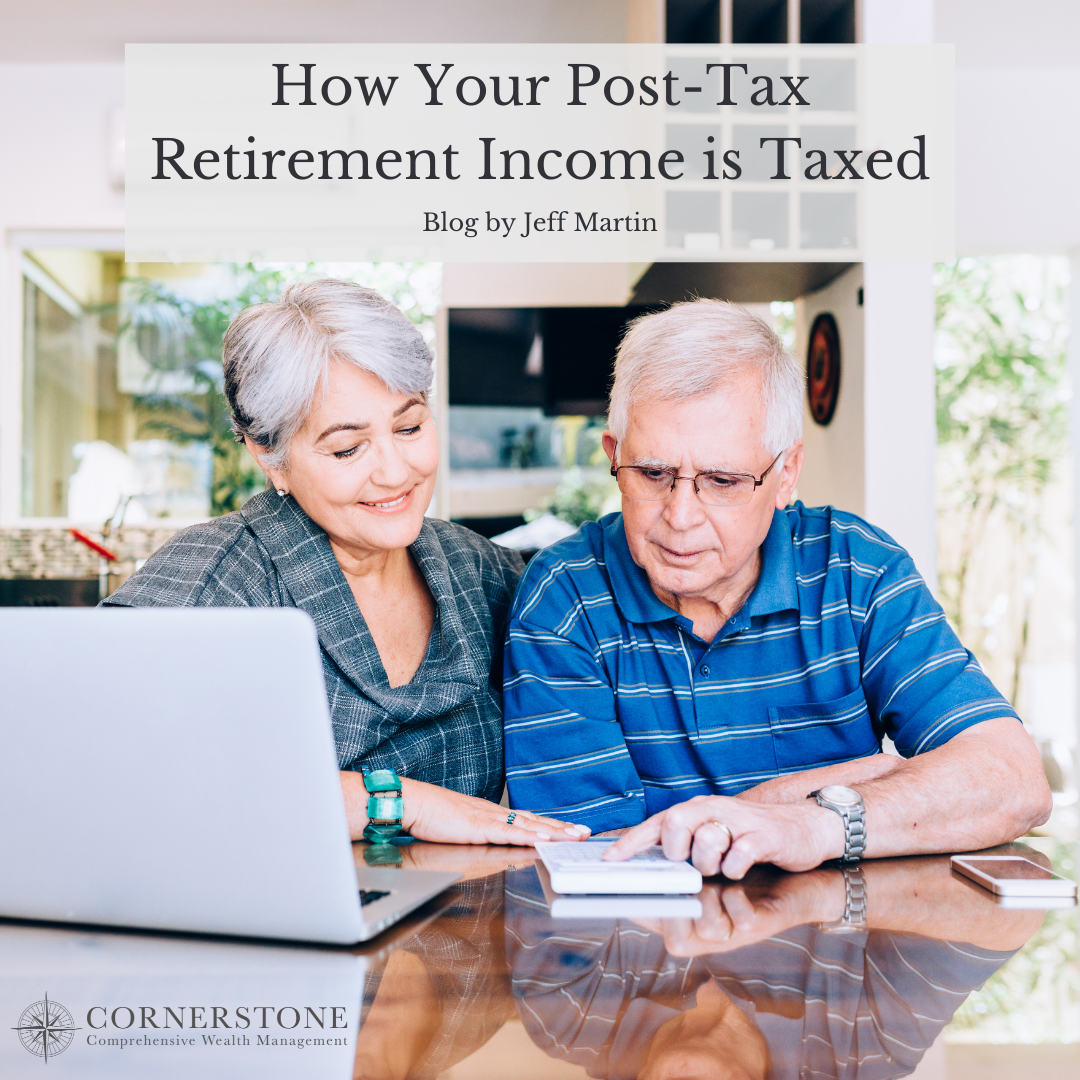How Your Post-Tax Retirement Income is Taxed
Jeff Martin is a financial advisor at Cornerstone based in Reno, NV. Jeff has earned the Life and Health Insurance Licensure and has passed the Series 65 examination. He enjoys being able to help clients create customized strategies for their portfolios based on their unique financial goals.
HOW YOUR POST-TAX RETIREMENT INCOME IS TAXED
Planning for retirement can be stressful and overwhelming, particularly given that much of the available information tends to focus on the growth and accumulation of your accounts. Rather than finding information about the preservation and income for your retirement plan.
The types of accounts you have contributed to during your working years to fund your retirement, will have an immense impact on your situation as a whole. Here’s a breakdown for why you need to plan for taxes in retirement and what a tax efficient option can be.
WHY SHOULD YOU CHOOSE POST-TAX RETIREMENT ACCOUNTS?
Prior to talking about a great tax efficient approach to your retirement income, we have to talk about the overwhelming recommendation of contributing to your 401k. Don’t get me wrong, this makes sense in many situations, as many employers will match your contributions to some extent.
However, most of the emphasis is on contributing to get a tax break while you make contributions. With little to no guidance on how you unwind the account. During your working years, your pre-tax 401k is likely your most tax advantageous account. Although, the day you retire, it quickly becomes your most tax toxic, given that every dollar that leaves the account is taxed as income.
The idea of post-tax funds in retirement is often overlooked, or unknown completely. Why would you want to have tax free assets in retirement? Well despite the obvious of not having to pay additional tax on the assets, taxes are going up. Simply put, you can expect to pay more in tax in the future on your taxable assets.
WHAT ARE YOUR POST-TAX INCOME OPTIONS?
Aside from pre-tax accounts (i.e. 401k), you have your post-tax accounts that usually include Roth/ Roth 401k accounts. This can be a popular option since you pay the taxes as you contribute and can have an accurate representation of exactly how much you’ll have during your retirement.
There is an additional category that some should consider, including: non-qualified. Simply put, this is a non-retirement investment account. These types of accounts are subject to capital gains tax, and at least for now, is almost always more favorable than income tax.
With capital gains, you only pay a portion of tax on the earnings, in addition to being able to write losses off to help offset your gains. It is also worth mentioning, that there are no “magic ages” with these types of accounts, meaning there are no rules stating the earliest you can take funds from the account, and eventually get forced to take withdrawals.
HOW DO YOU CHOOSE THE BEST ACCOUNT OPTION?
How do you know which type of account you should be putting your hard-earned dollars into? I wish there was a simple and direct answer for this, but it depends on too many factors. Each situation is as unique as a fingerprint. What makes sense in one scenario, may be entirely counterproductive in another.
To get a clearer understanding of the tax ramifications you can expect from contributing to the recommended pre-tax accounts, you can contact a financial advisor. At Cornerstone, we take a comprehensive look at your specific situation to better understand how your financial plan will affect your retirement.
We will help make sure that you won’t further agitate a potential tax bomb by following the “default” recommendations. Our advisors consider what accounts you have, the tax ramifications on your financial plan, and the lifestyle you’d like to live during your retirement.
You envision the life you want to live, and we’ll help you create a plan to live out your ideal retirement.
Based in Reno, NV, Cornerstone is for individuals and families looking to grow wealth, protect and preserve their life savings, and plan for the distribution of their estate in a tax-efficient manner through a tailored strategy. Schedule a time to discuss your financial goals with us.



